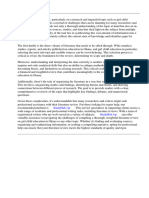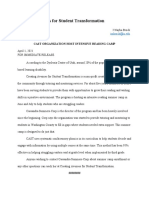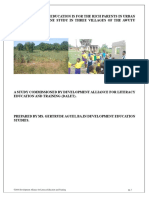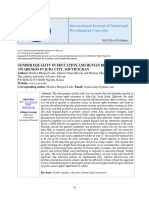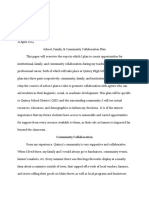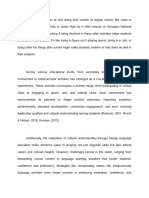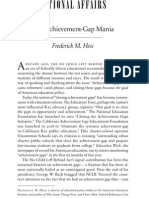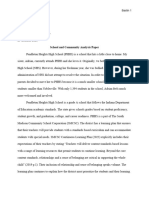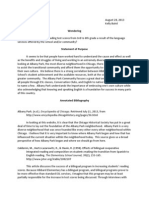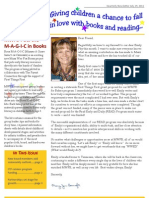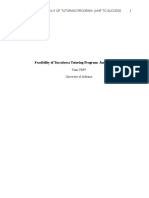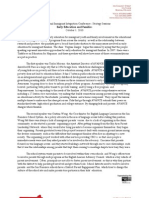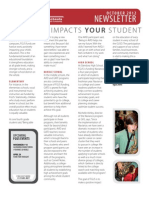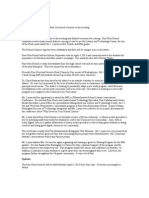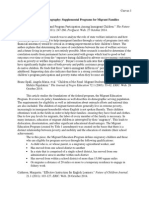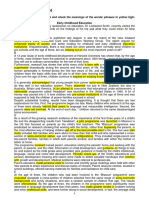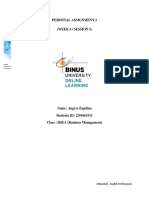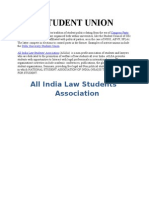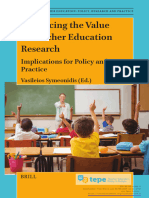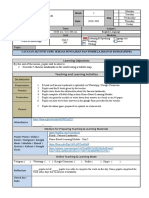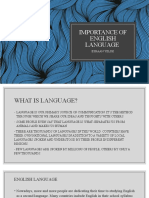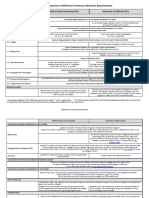Feature Story Fixed
Feature Story Fixed
Uploaded by
api-313350571Copyright:
Available Formats
Feature Story Fixed
Feature Story Fixed
Uploaded by
api-313350571Original Title
Copyright
Available Formats
Share this document
Did you find this document useful?
Is this content inappropriate?
Copyright:
Available Formats
Feature Story Fixed
Feature Story Fixed
Uploaded by
api-313350571Copyright:
Available Formats
Media Contact:
Michael Maurice
Program Director, Office on Children & Youth
540-568-6007
mauricma@jmu.edu
Matt Webb
Public Relations
203-291-9676
webbmg@dukes.jmu.edu
All Aboard for Reading
HARRISONBURG, VA.8 Apr 2016. Its a chilly Friday evening, and dozens of local
Stone Spring Elementary School students are waiting for the bus. But this isnt their everyday
school bus and these children are already at school, most of them alongside their parents. The
crowd has assembled in anticipation for the Gus Bus and its twice-a-semester Family Literary
Night event.
All this excitement over a visit from a bus may seem unusual, but the Gus Bus isnt a typical vehicle. This was exactly the intention of Pat Kennedy back in 2004 when she and a group of other
educational professionals set out to address the fact the half of local kindergarteners at the time
were beginning school unprepared. The winning idea was a "reading road show, as a way to
bring reading materials to underprivileged students who may have otherwise not had the same
access to them. Kennedy worked with the school district and Harrisonburg police to narrow
down a route that would be most effective at reaching a large number of students.
(more)
The Office on Children and Youth
Feature Story: Gus Bus | !2
The Chik-fil-A cow joins children in lining up in front of the bus to participate in the Office on
Children & Youths Family Fun Festival.
The project has only grown in the years since, with two buses now making their way through
neighborhoods and apartment complexes in Harrisonburg, Rockingham, and Page County, not to
mention hosting frequent special events at locations varying from Chik-fil-A to the Massanutten
Water Park to elementary schools like Stone Spring.
Just like how the bus's range has spread out geographically, its scope of activities has also grown
to encompass additional crafts, healthy living activities, tutoring programs, and the chance for
participating children to take home two books with them every week to practice, as many do not
have consistent access to a library. Funding from the Virginia Department of Education has allowed the bus to launch a series of after school enrichment programs relating to math, science,
and the arts. The Blue Ridge Area Food Bank has also stepped up to provide each child with a
take-home food bag at the conclusion of their hour on the bus as a part of their BackPack program; over 6,000 food bags were given out just in 2014.
(more)
The Office on Children and Youth
Feature Story: Gus Bus | !3
This is far from the only example of the broader Harrisonburg community getting involved with
the buss activities. In addition to benefiting from grants and private donations, the program is
sponsored by JMUs Institute for Innovation in Healthy and Human Services (IIHHS). And
whether as volunteers or through integration with a number of majors and classes at the university, JMU students jump at the chance to assist the program coordinators with reading to the children, helping to run special events and more.
It makes sense because these are programs that benefit everyone. Kennedy names studies that
demonstrate reading to children before they start preschool greatly ups their chances of succeeding in school. The purpose of the bus is to supplement both sides of this transition, with a focus
on preschool-aged children and younger during the day and then in the evenings further opportunities for older students to receive homework help. The advantages extend to children of all demographics. As not all of the children who frequent the bus speak English, there are books in different languages to accommodate everyone who wants to come on and read. The buss features
have even attracted on board parents trying to learn English as a second language.
(more)
The Office on Children and Youth
Feature Story: Gus Bus | !4
This is not the only aspect of the buss activities that functions to help parents as well as children;
in fact trying to get parents and their children learning together has long been a major goal of the
organization. Haley Springer, program coordinator for the Reading Road Show, explains: A lot
of great research shows that learning starts in the home. Exploring the idea that student literacy
begins with parent literacy before anything else, the Gus Bus has also been in collaboration with
JMU's branch of the Career Development Academy to hone in on strengthening English and
civic literacy skills for everyone in these homes. With IIHHSs help, families can take classes in
these areas for sharply reduced prices, fulfilling the dual purpose of bringing parents in as partners in their childrens education while they walk away with tangible real-life benefits as well.
These years of steady expansion and diversification have cemented the Gus Bus as an enormous
success. In a little over a decade since the start of the program, Harrisonburg and its surrounding
counties have seen an increase from about half of kindergarteners properly equipped to start
school to closer to five-sixths of kindergarteners. A few years past this threshold, the next major
goal is to have children reading at standard level by grade three. Springer cites numerous other
studies that show this is a crucial point not only in a childs educational development but also on
a more personal level, with the children under grade level at a greater risk for various problems
at home later in their school years and beyond. In this way the Gus Buss multilayered approach
to supplemental education is going beyond just raising family literacy levels and striving to carve
out better overall lives. Going by the numbers, by this measure the program has been thriving.
###
The Office on Children and Youth
Feature Story: Gus Bus | !5
About The Office on Children and Youth
The Office on Children and Youth aims, in their words, to promote positive youth development
through working with all youth-serving organizations in Harrisonburg and Rockingham County.
The Office collects and utilizes data relevant to the needs of youth and the surrounding community to be a source of information and change. More information at http://www.theocy.org/
You might also like
- Analyzing Various Sectors of ICT and Evaluating Potential Career and Business Prospects.Document3 pagesAnalyzing Various Sectors of ICT and Evaluating Potential Career and Business Prospects.Lydel De Chavez Gatcho100% (1)
- Sample - Social Innovation ProjectDocument12 pagesSample - Social Innovation ProjectMATTHEAUS HRODRICH IMMACULATANo ratings yet
- Semi-Detailed Lesson Plan in English 2Document7 pagesSemi-Detailed Lesson Plan in English 2ROSAN BADILLO100% (1)
- Education Sample Study Plan For Graduate Study As A WholeDocument3 pagesEducation Sample Study Plan For Graduate Study As A Wholecatherinecute0% (1)
- Newsletter FixedDocument5 pagesNewsletter Fixedapi-313350571No ratings yet
- Conclusion FinalDocument6 pagesConclusion Finalapi-203628992No ratings yet
- Startribune - 10:19:2014Document2 pagesStartribune - 10:19:2014api-269086865No ratings yet
- Literature Review On Girl Child Education in GhanaDocument5 pagesLiterature Review On Girl Child Education in Ghanaea86yezdNo ratings yet
- Kids Can Fly Feature GoodDocument5 pagesKids Can Fly Feature Goodapi-544746858No ratings yet
- Diversity Action PlanDocument5 pagesDiversity Action Planapi-279800731No ratings yet
- Research Seminar Research SummaryDocument20 pagesResearch Seminar Research SummaryJohnny BravoNo ratings yet
- Broadcast News Release - CastDocument2 pagesBroadcast News Release - Castapi-548583731No ratings yet
- Edci 520Document9 pagesEdci 520api-525531310No ratings yet
- DALET HouseHold SurveyDocument35 pagesDALET HouseHold SurveyDALETNo ratings yet
- WhitepaperDocument10 pagesWhitepaperapi-346597479No ratings yet
- Schools As Learning CommunitiesDocument8 pagesSchools As Learning CommunitiesekicNo ratings yet
- School and Community AnalysisDocument6 pagesSchool and Community Analysisapi-644230134No ratings yet
- Head Start ProposalDocument9 pagesHead Start Proposalapi-384459604No ratings yet
- Gisi Press ReleaseDocument2 pagesGisi Press Releaseapi-232689619No ratings yet
- Hamlit SourceDocument3 pagesHamlit SourceAlyka MNo ratings yet
- Bazlica Mavole Okuku Gender Equality in Education and Human Rights Juba SSDocument16 pagesBazlica Mavole Okuku Gender Equality in Education and Human Rights Juba SSJohnson MavoleNo ratings yet
- GppssDocument7 pagesGppssapi-200020053No ratings yet
- Community Asset Map NarrativeDocument13 pagesCommunity Asset Map Narrativeapi-355168914No ratings yet
- We Need Your Help!: Possible To Participate As It Will Provide Us With Prudent Information To Help Us Better Assist OurDocument4 pagesWe Need Your Help!: Possible To Participate As It Will Provide Us With Prudent Information To Help Us Better Assist OurMichelle KrugerNo ratings yet
- Edci 449 Community OutreachDocument7 pagesEdci 449 Community Outreachapi-743671953No ratings yet
- Reading Instruction in KindergartenDocument12 pagesReading Instruction in KindergartenphongNo ratings yet
- Thesis On Girl Child Education in GhanaDocument6 pagesThesis On Girl Child Education in Ghanaafkntwbla100% (2)
- Final News EditedDocument22 pagesFinal News EditedLeo Jaranilla GutierrezNo ratings yet
- Special Needs and Services: Philosophy, Programs, and Practices for the Creation of Quality Service for ChildrenFrom EverandSpecial Needs and Services: Philosophy, Programs, and Practices for the Creation of Quality Service for ChildrenNo ratings yet
- Fall Newsletter 2015 18 1Document6 pagesFall Newsletter 2015 18 1api-299256145No ratings yet
- Chelsielambertresume 2019Document5 pagesChelsielambertresume 2019api-311387015No ratings yet
- Group5 IntroDocument7 pagesGroup5 IntroNash HagosNo ratings yet
- Impact Study Report of Multiligual Education Programme of Oxfam in BangladeshDocument66 pagesImpact Study Report of Multiligual Education Programme of Oxfam in BangladeshOxfam in BangladeshNo ratings yet
- Our Achievement-Gap Mania: Frederick M. HessDocument17 pagesOur Achievement-Gap Mania: Frederick M. Hesslps2001No ratings yet
- School and Community Analysis EssayDocument7 pagesSchool and Community Analysis Essayapi-700079305No ratings yet
- Kindergarten Teachers Speak OutDocument21 pagesKindergarten Teachers Speak OutJohanna SaldoNo ratings yet
- Resume 11 17nopersonalinfoDocument2 pagesResume 11 17nopersonalinfoapi-381659399No ratings yet
- Fondren Forges Ahead As Ib Campus Tom Behrens February 4 2014Document2 pagesFondren Forges Ahead As Ib Campus Tom Behrens February 4 2014api-262375938No ratings yet
- Eng Major 20 - Teaching and Assessment of Literature StudiesDocument5 pagesEng Major 20 - Teaching and Assessment of Literature StudiesGeorge Kevin TomasNo ratings yet
- April 22 Parent Leader MeetingDocument2 pagesApril 22 Parent Leader Meetingapi-251362692No ratings yet
- Universal Preschool Is No Golden Ticket: Why Government Should Not Enter The Preschool Business, Cato Policy Analysis No. 333Document31 pagesUniversal Preschool Is No Golden Ticket: Why Government Should Not Enter The Preschool Business, Cato Policy Analysis No. 333Cato InstituteNo ratings yet
- NEWS Domoit Elementary School Embraces Tara Basa Program To Boost LiteracyDocument1 pageNEWS Domoit Elementary School Embraces Tara Basa Program To Boost LiteracySir DenverNo ratings yet
- Masters Research W LinkDocument11 pagesMasters Research W Linkapi-539198127No ratings yet
- Professional ResumeDocument3 pagesProfessional Resumeapi-270001148No ratings yet
- Westminster Woods Public School HomeworkDocument4 pagesWestminster Woods Public School Homeworkafmsqcodt100% (1)
- Description: Tags: Ready2readDocument7 pagesDescription: Tags: Ready2readanon-662897No ratings yet
- Final Annotated BibDocument4 pagesFinal Annotated Bibapi-253740171No ratings yet
- MWFB Puts The M-A-G-I-C in BooksDocument4 pagesMWFB Puts The M-A-G-I-C in BooksmakewayforbooksNo ratings yet
- Ferlazzo (2011)Document6 pagesFerlazzo (2011)angelajohnson1983No ratings yet
- Education Supplement, 19 May 2016, Issue 951Document16 pagesEducation Supplement, 19 May 2016, Issue 951Jewish NewsNo ratings yet
- Critical Mapping Assignment By: Abby PateDocument5 pagesCritical Mapping Assignment By: Abby Pateapi-455230901No ratings yet
- Feasbility Study Example 1Document5 pagesFeasbility Study Example 1api-340244809No ratings yet
- Brigada Eskwela Write UpDocument3 pagesBrigada Eskwela Write UpMae Shellah AbuyuanNo ratings yet
- The Imperative For High-Quality Pre-KDocument24 pagesThe Imperative For High-Quality Pre-KHoover InstitutionNo ratings yet
- Early Education and Families - NIIC 2010Document3 pagesEarly Education and Families - NIIC 2010MIRA CoalitionNo ratings yet
- Issue Guide 1Document26 pagesIssue Guide 1api-548620093No ratings yet
- FGUS Newsletter October 2012Document2 pagesFGUS Newsletter October 2012Glendora Education FoundationNo ratings yet
- Growing Young MindsDocument52 pagesGrowing Young MindsLJ's infoDOCKET100% (1)
- April 2013 PTO MinutesDocument2 pagesApril 2013 PTO MinutescwegillespieNo ratings yet
- 2 Annotated BibliographyDocument3 pages2 Annotated Bibliographyapi-272219803No ratings yet
- Unit 13 EducationDocument5 pagesUnit 13 EducationLinh NguyễnNo ratings yet
- FULL Download Ebook PDF Getting It Right For Young Children From Diverse Backgrounds 2nd Edition PDF EbookDocument47 pagesFULL Download Ebook PDF Getting It Right For Young Children From Diverse Backgrounds 2nd Edition PDF Ebookevelyn.goldberg681100% (50)
- Playful Activities for Reading Readiness: Laying a Foundation for LiteracyFrom EverandPlayful Activities for Reading Readiness: Laying a Foundation for LiteracyNo ratings yet
- Narrative - English MajorDocument39 pagesNarrative - English MajorMelanie TobiasNo ratings yet
- Dr. Solomon OsoferoDocument7 pagesDr. Solomon OsoferodigibebiNo ratings yet
- Brumfit AwardDocument8 pagesBrumfit AwardDrGeePeeNo ratings yet
- Daniel Costa: Vision of Educational LeadershipDocument1 pageDaniel Costa: Vision of Educational Leadershipapi-469532329No ratings yet
- ICT Policy and StrategyDocument32 pagesICT Policy and StrategySalim HassenNo ratings yet
- 1911 - Engl6163 - Dsea - Pa2-W4-S5-R2 - 2201865311 - Angrys EnjelinaDocument11 pages1911 - Engl6163 - Dsea - Pa2-W4-S5-R2 - 2201865311 - Angrys Enjelinaangrys enjelinaNo ratings yet
- A Student UnionDocument8 pagesA Student UnionAshish VishwakarmaNo ratings yet
- La Trobe SopDocument5 pagesLa Trobe SopVaishnavi DeshamoniNo ratings yet
- Introduction To Special and Inclusive EducationDocument17 pagesIntroduction To Special and Inclusive EducationHonda Rs 125100% (3)
- Enhancing The Value of Teacher Education Research: Implications For Policy and PracticeDocument370 pagesEnhancing The Value of Teacher Education Research: Implications For Policy and PracticePhuong Trinh NguyenNo ratings yet
- Beginning-of-Year Induction Programme and Contact Time ScheduleDocument12 pagesBeginning-of-Year Induction Programme and Contact Time ScheduleJosephPangNo ratings yet
- Teachers Induction Program Course 2Document23 pagesTeachers Induction Program Course 2Timoteo, Jr. Ramirez100% (4)
- Practical Research 1: Quarter 3 - Week 4: Identifying The Inquiry and Stating The ProblemDocument14 pagesPractical Research 1: Quarter 3 - Week 4: Identifying The Inquiry and Stating The ProblemRAEJEHL TIMCANGNo ratings yet
- The Effectiveness of Google ClassroomDocument11 pagesThe Effectiveness of Google ClassroomgauravsushantNo ratings yet
- Pengembangan Model Penilaian Ksave Dalam Pembelajaran SejarahDocument18 pagesPengembangan Model Penilaian Ksave Dalam Pembelajaran SejarahnovaNo ratings yet
- Education System EthiopiaDocument26 pagesEducation System EthiopiaDustin RodriguezNo ratings yet
- Panel DiscussionDocument4 pagesPanel DiscussionAlwin AsuncionNo ratings yet
- Edited RMO Lesson PlanDocument2 pagesEdited RMO Lesson PlanAdzna AhmadNo ratings yet
- Kajiado-Longido-Pastoralists Needs Assessment ReportDocument37 pagesKajiado-Longido-Pastoralists Needs Assessment ReportPhilip OlesitauNo ratings yet
- Importance of EnglishDocument10 pagesImportance of EnglishDerek PlayZNo ratings yet
- ABLLS Training Day 2Document51 pagesABLLS Training Day 2Hukumukho HyanglaNo ratings yet
- Event Management Book of Knowledge (MJ Maguire 29326959)Document6 pagesEvent Management Book of Knowledge (MJ Maguire 29326959)Bailey SnymanNo ratings yet
- Mind MapDocument1 pageMind Mapangelica.amandy.gNo ratings yet
- Csu Uc A G Comparison MatrixDocument2 pagesCsu Uc A G Comparison Matrixapi-229524095No ratings yet
- Reflective Essay Guide QuestionsDocument6 pagesReflective Essay Guide QuestionsBea Claresse Tarape100% (1)
- Teachers Daily Work Done StatementDocument5 pagesTeachers Daily Work Done StatementLalithNo ratings yet
- Study Guide - Visual Graphic DesignDocument5 pagesStudy Guide - Visual Graphic DesignAileen ElegadoNo ratings yet







